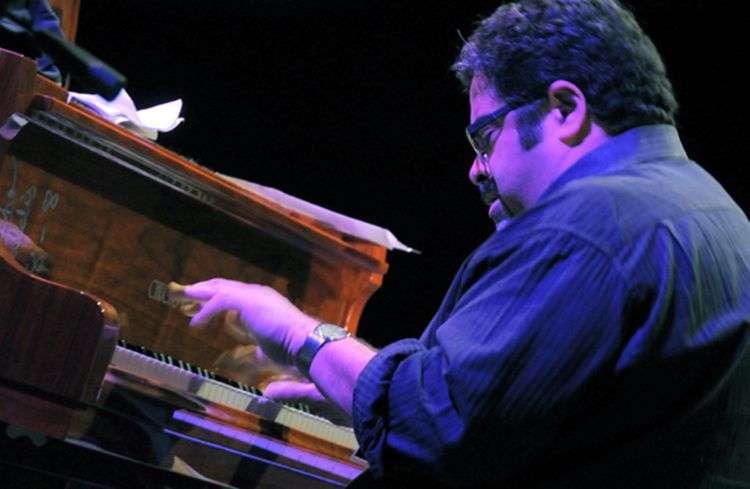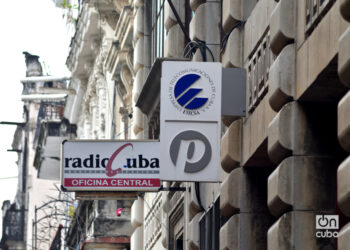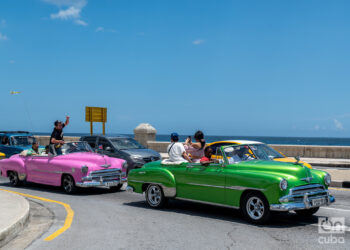The presence of Arturo O’Farrill has already become recurring in the scenarios of Jazz Plaza Festival. From the first time he traveled to Cuba he has had the dream to connect himself more and more and more-he insists in putting it that way- with the land of his father. Because what matters is not where you were born, but from where you come. Born in Mexico and grew up in the United States, O’Farrill speaks in Spanish with the classic gringo accent. Coexistence of multiple items at once, Latino, Hispanic, African and American to merge into music: Latin jazz.
“I feel that there is a too strong, too intense love between Cuba and the United States. A passion that has not to do only with politics or ideology-that is secondary, but with the simple fact that people to love each other. For example, I live there, but when I’m here I feel I am in my land, with my people .
“When Dizzie Gillespie met the great conga player Chano Pozo, a conversation about the roots they had in common was established between them, despite their different nationalities to the extent that Dizzie once said: “I do not speak Spanish and he does not speak English, but we both speak Africa”. And I began to think, because when you meet someone who shares your roots, the following thing is to ask yourself, where are we going now? Dizzie always said that Afro-Cuban music and jazz are not entirely separated. And I believe it. It is much more important to us and the progress of our music to understand and follow the path we have together.
“So it is the project ¨Conversacion continuada¨ (Continued conversation), where I gave to six musicians the mission of making that composition. From one side there are Yassek Manzano, Michel Herrera and Alexis Bosch, and the other side includes Michel Brouswomen, Arturo O’Farrill and Darris Prieto. Although it is difficult because we can not spend all the time together, the imaginary conversation is present on the CD and the project. We have elements from Africa, Cuba, religion, DJs … It’s a very nice album that we will record here at Abdala Studios.
” But the Continued Conversation is not just an album; it’s a whole concept for education. I have the dream of bringing students from the US and make a workshop of 3 or 4 weeks which gave rise to a new orchestra conducted by themselves, with their own music. It is a cultural exchange that will have implications later, socially and ideologically: following the conversation started by Dizzy and Chano.
How essential is the Cuban element within jazz?
“It is fundamental. Look, basically, what exists is the swing, tumbao, groove, or whatever you want to call it. The issue is how to understand, feel those rhythms. The great ones did understand, Dizzie, Louis Armstrong; that without the Latin or Afro-Cuban touch there can be no jazz. Unfortunately many jazzmen see us, the Latinos, as below them. They say we are interesting, exotic, with our guayabera shirts, playing these very complicated rhythms. They see us as incredible, but rare. However, on the Cuban side it is the opposite: the latin jazz is venerated. And that hurts me because we really are people who have the same language, musically speaking.
“Of course, to play Latin music you have to grow up many years listening and understanding that style; getting familiar with the instruments, such as the bongo, bell, drums, etc; but that swing that the Latin style has is too strong. Some people think they are going to play Latin music because they want, and they fail because they do not feel the African matter that is in it.
“In North America, for example, there are versions of Latin music that sleep you, because they have nothing of timba. And if you listen to the institutions that teach and present latin jazz in Los Angeles you believe that the rhythm died there.
“Now we have there to Pedrito Martinez, who is doing nice things in the United States, showing the American public what Cuban music is, but not by religion, but by its modernity and elegance. He represents the finest of Afro-Cuban music, and is getting a lot of support and success. This year the world’s most important American jazz institution, the Jazz Lincoln Center of Wynton Marsalis, included Pedrito Martinez, Chucho Valdés and lots of Cuban music in its inaugural concert.
“There is a man who says that Cubans play turbo jazz, because they are very talented and have very good technique, it is true; but there is more. There are Cubans who play with pure heart. Yassek Manzano, for example, he does not play notes, he plays music from the soul. And I as a consumer do not want to hear notes. In fact, I hate the notes. If I can feel the passions, emotions, paranoia, what scares a musician when playing, what he likes, if I can hear all this in a note from him, then it is much more important than anything else. So, Americans go crazy with Cuban music.
“Luckily the youth of America are now mixing hip-hop, DJ elements, and Indian rhythms. Because the traditional jazz was already done, what sense does it have to do it again? If the original musicians already did it very well, why are we going to play what they played better? Playing something new is to advance the art.
“And finally, when you look and analyze, there is no such jazz, neither Afro-Cuban, nor classic or modern, but just music. For me, Mozart is connected to Lupe Fiasco, Dizzie Gillespie, Ernesto Lecuona, Bach; he is constant, like water. That sea out there, O’Farrill says pointing to Malecon- is connected with Russia, Indonesia. If we truly believe that music is like the sea, we will know that there is no division possible, and that everything is connected by a common root, whatever it may be. “










